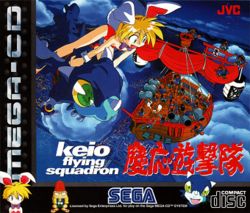Keio Flying Squadron (video game)
Topic: Software
 From HandWiki - Reading time: 2 min
From HandWiki - Reading time: 2 min
| Keio Flying Squadron | |
|---|---|
 European cover art | |
| Developer(s) | Victor Entertainment |
| Publisher(s) | JVC Musical Industries |
| Designer(s) | Teruhito Yamaki |
| Artist(s) | Hiroshi Ogawa Hitoshi Kakumu |
| Writer(s) | Satoru Honda |
| Composer(s) | Tsukasa Tawada |
| Series | Keio Flying Squadron |
| Platform(s) | Sega CD |
| Release | |
| Genre(s) | Scrolling shooter |
| Mode(s) | Single-player |
Keio Flying Squadron (慶応遊撃隊 Keiōyūgekitai) is a scrolling shooter video game for the Sega/Mega CD. It was developed by Victor Entertainment and first published in Japan in 1993, and later in Europe and North America in 1994. It is the first game of the Keio Flying Squadron series with a simple shoot-'em-up style of play.
Gameplay
The game consists of the protagonist Rami riding on top of Spot, who can shoot fireballs at enemies.[1] When Spot is not firing, two smaller dragons (Companion fighters) appear one after another to assist Rami and Spot. The lesser dragons shoot smaller fireballs and can be sacrificed to do larger damage, only to reappear when Spot ceases to shoot. The game also features animated cut scenes, provided by Studio Pierrot.
Plot
Release
Keio Flying Squadron was released on August 6, 1993, in Japan, and on November 10, 1994, in North America by Victor Entertainment.[2] In the United Kingdom, a playable demo disc for Keio Flying Squadron containing the first stage was provided by the Sega Pro CD magazine in its December 1994 issue. While the demo ends after the first stage, it is identical to the full version, and the whole game is accessible in the demo disc by using a level select cheat code.[3]
Reception
Retro Gamer included among top ten Mega CD games, calling it "a perfectly acceptable substitute" OF Konami's Parodius that features "similar style of horizontally scrolling wackiness and puts the Mega-CD hardware to good use to produce some excellent cut-scenes and a brilliant CD-quality soundtrack."[4]
Next Generation reviewed the game, rating it two stars out of five, and stated that "The game received an extra star because a few bits actually made us laugh, but that's it."[5]
References
- ↑ "ProReview: Keio Flying Squadron". GamePro (IDG) (69): 56. April 1995.
- ↑ "Error: no
|title=specified when using {{Cite web}}" (in Japanese). Sega. Archived from the original on July 6, 2013. https://web.archive.org/web/20130706231514/http://sega.jp/fb/segahard/mcd/soft_licensee.html. Retrieved August 26, 2016. - ↑ "Keio Flying Squadron - Sega Pro Demo". The PAL Mega-CD Library. http://www.sega-mega-cd-library.co.uk/Demo%20Pages/Keio%20SP%20Demo.htm. Retrieved August 26, 2016.
- ↑ http://www.retrogamer.net/top_10/top-ten-mega-cd-games/
- ↑ "Finals". Next Generation (Imagine Media) (5): 95. May 1995.
External links
- Keio Flying Squadron at MobyGames
- Keio Flying Squadron at Hardcore Gaming 101
 KSF
KSF